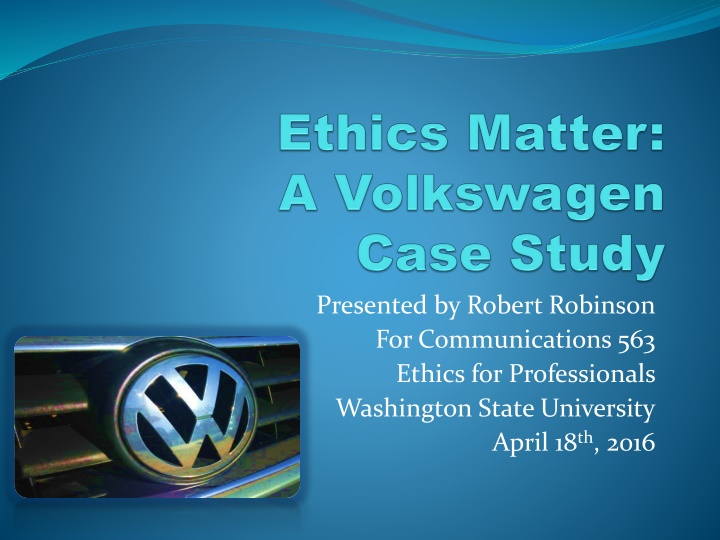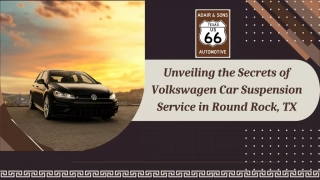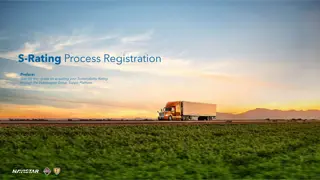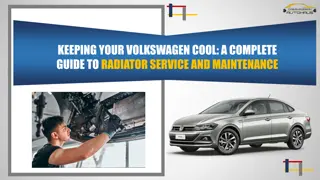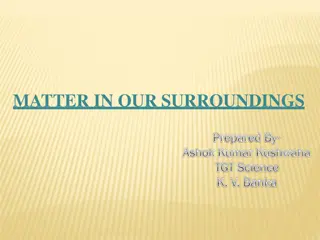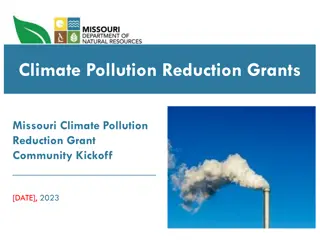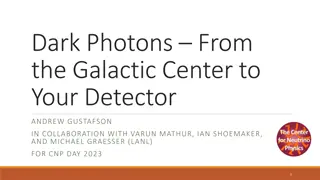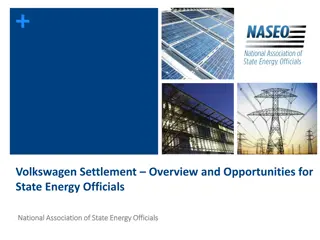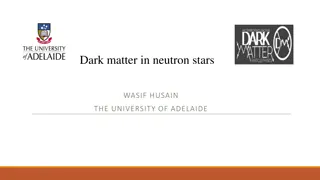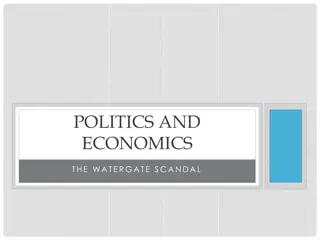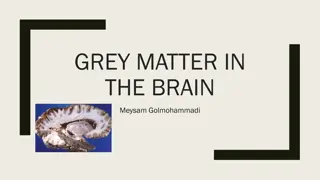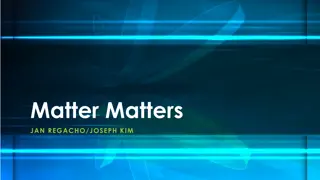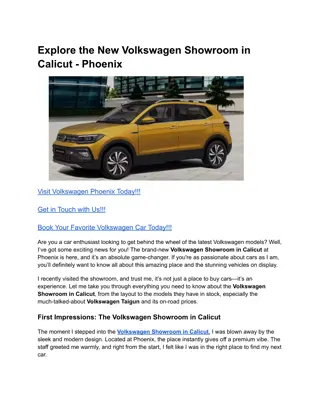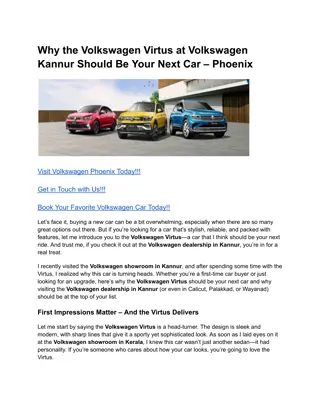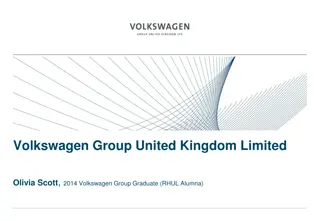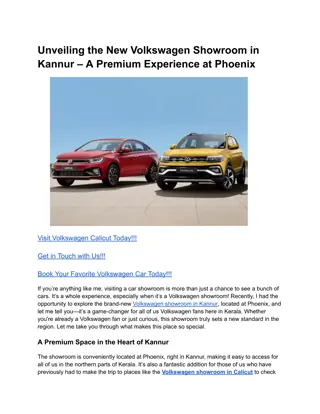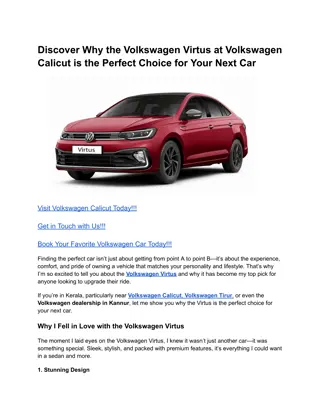Ethics Matter: The Volkswagen Scandal - A Case Study
Recent corporate scandals like Enron and Volkswagen emphasize the critical importance of ethics in business practices. This case study delves into the Volkswagen scandal, where the company was accused of rigging cars to cheat emission tests, leading to severe consequences. The response from VW's CEO, subsequent global repercussions, and ethical dilemmas faced are explored, highlighting the dire consequences of ethical misconduct in corporate environments.
Download Presentation

Please find below an Image/Link to download the presentation.
The content on the website is provided AS IS for your information and personal use only. It may not be sold, licensed, or shared on other websites without obtaining consent from the author.If you encounter any issues during the download, it is possible that the publisher has removed the file from their server.
You are allowed to download the files provided on this website for personal or commercial use, subject to the condition that they are used lawfully. All files are the property of their respective owners.
The content on the website is provided AS IS for your information and personal use only. It may not be sold, licensed, or shared on other websites without obtaining consent from the author.
E N D
Presentation Transcript
Presented by Robert Robinson For Communications 563 Ethics for Professionals Washington State University April 18th, 2016
Ethics Matter: A Volkswagen Case Study Introduction into Ethical Scandals A number of recent corporate scandals remind us that ethics matter. There was the Enron scandal resulting from the fundamental breakdown of ethical communication and accountability of actions (Seeger & Ulmer,2003). The consequences were devastating for shareholders and the countries in which they operated. The company collapsed. Now we have the Volkswagen scandal. The scandal is centered upon the use of software defeat devices installed in cars to indicate that pollution emissions are reduced when they are not.
Communicating Ethics Here is a quote from the Volkswagen Sustainability Report in 2014. The rhetoric stresses the importance of their commitment to the environment and their battle against corruption. These are words to remember as the following year they were embroiled an environmental scandal based on corrupted software. A sustainable supply chain and environmentally compatible transportation solutions form an indispensable part of demonstrating comprehensive responsibility for human rights, as well as commitment to the environment and to the battle against corruption. Volkswagen Sustainability Report 2014, p. 6
VW Ethical Dilemma Background In September of 2015, the United States Environmental Protection Agency accused Volkswagen of deliberately rigging 482,000 VW and Audi cars with 2-liter, four-cylinder engines with a defeat device in order to evade the higher demands of the Clean Air Act (Woodyard, 2015). It was reported that software had been inserted into the cars to let them perform better on emissions when they detected a test was being conducted (Woodyard, 2015). In short, United States pollution tests were falsified.
The VW Response The CEO of the company apologized and admitted to cheating. He resigned. On September 22, 2015, the scandal expanded to 11 million vehicles worldwide (Korosec, 2015; Cremer, 2015). A statement released by VW stated, The Volkswagen Supervisory Board consulted intensively on the current situation at its meeting on Friday, September 25th. There is absolutely no excuse for the manipulations which have deeply shocked Volkswagen. The company will leave no stone unturned in getting to the bottom of this, will call those responsible to account, and take the necessary actions (Volkswagen.com, 2015).
The Ethical Dilemma A statement to Congress by Michael Horn, the CEO of the Volkswagen Group of America indicated he knew about the potential trouble with the diesel emissions since 2014 (Ivory & Ewing, 2015). He was assured by the company that a plan was being developed to bring the vehicles into compliance. The fact that this issue was known prior to the EPA revelations indicates not only a failure of ethical conduct by installing the defeat devices but also how these issues were not communicated within the organization and to the public. These actions were unethical and went against everything the Volkswagen Code of Conduct represents.
The Ethical Conflict It was the responsibility of the software engineers to ensure safety and trust in the product (Yotam, & Mark,2015). The VW software engineers could be compared to the accountants in the Enron case who collaborated with the organization to bypass regulations. It may be the case that this was not just a few rogue engineers. The devices had to be tested and evaluated over time. The implications are that it may go up the corporate ladder. Everyone involved had to know it was unethical (Patel, 2015). Lee Hibbert of Professional Engineering stated, I can t imagine how a fraud of such sophistication could be conceived and delivered by an internalized group of engineers without knowledge elsewhere the specific chains of command can be identified (Hibbert, 2015, p.3).
Organizational Ethics As industry regulations increased there was also pressure to increase profitability to please shareholders. If all you have to do is check off a list of rules, it implies that as long as you don t get caught violating the rules, you might get away with it suggested Shannon Vallor, Chair of the Department of Philosophy at Santa Clara University (Patel, 2015). It appears that implementing and consistently applying business ethics continue to play an important role in scandals.
VW Code of Conduct: Statement about the Application of Values within the Organization The words are clear: Our common goal is to be number one among the world s automobile manufacturers and to make individualized, sustainable, and safe mobility based on superior quality possible for people throughout the world. The Volkswagen Group has always considered itself bound by more than just legal and internal regulations. We also see voluntary commitments and ethical principles as an integral component of our corporate culture, providing a frame of reference we can use to guide our decision-making. It is our conviction that sustainable economic success can only be safeguarded by following rules and standards. In our daily business we advocate honorable and honest behavior that complies with the rules. Volkswagen Code of Conduct, 2015.
How did this scandal emerge with such a great Code of Conduct? A code of ethics statement is necessary for a company to establish its norms and beliefs about the organization (Johannesen, Valde & Whedbee, (2008). It attempts to encourage ways of thinking and attitudes to achieve ethical conduct. This in turn as applied to conduct believed to facilitate the wanted behaviors and actions (Wood & Rimmer, 2003). Volkswagen reported a Code of Conduct in an attempt to integrate values and conduct (Volkswagen Code of Conduct, 2015). Volkswagen has an outstanding code of conduct! A well written document! So what happened? The ethical dilemma centers on the company as actor and the individual actors involved in creating the defeat device. The theories and models applied to this situation are drawn from organizational ethics, code of ethics and virtue ethics. Two options are considered: The actual option selected by the company and the option that could have been selected. Implications of each will be reviewed.
Option 1: Create the devices to maintain competitiveness and risk discovery. Organizational Ethics Issues: The leadership of the VW organization impacts the ethical standards and moral practices of people in the organization. The organization and the values are reflected in the day-to-day work environment. If the environmental regulation pressures and added costs created pressure on the company, the defeat devices may have been intended as a temporary short term solution in order to buy time. This situation may have been motivated by the company leadership to over-ride ethical code judgement and application of standards. The leadership and the engineers involved should not have created the devices. Hiding the defeat devices was unethical as there was no communication of the issue until the U.S. Government discovered the problem.
Option 1: Create the devices to maintain competitiveness and risk discovery. Code of Conduct Issues: The Volkswagen ethical standards clearly stated one of the major goals was to protect the public interest and safety and to provide ethical guidance. The actions did not match the words. It may be in the case that the Volkswagen code of conduct may not be enough to guide actions if the business structure allows individuals to choose morally independent actions (Wood & Rimmer, 2003). The code of conduct, if applied as written, would not encourage the creation of the defeat devices. Virtue Ethic Issues It was the responsibility of the software engineers and the corporate leaders to ensure safety and trust in the product. The decision to install this software creates a perception that the company lacks virtue. Aristole described virtue as a character trait that was observed in habitual actions (Rachels, 2015). In the case of VW, honesty is a trait that applies here. Integrity and concern for the common good was not supported by the company s action. Robert Solomon argues that the most dangerous crooks are those that bend the rules for their own purposes (1993).
Option 2: The software engineers report the design and installation of defeat devices. Organizational Ethics Issues The organizational leaders established ethical standards which are transparently and openly integrated at all levels of day-to-day operations (Jondle, Maines, Burke & Young, 2013). Volkswagen actively models integrity with open honest reciprocal communication within the organization. Volkswagen conducts integrity audits so employees can report if openness exists to tackle ethical problems (White, 1992). The company commits resources to seek options to alternative courses of action when ethical conflicts arise (Jondle, Maines, Burke & Young, 2013).
Option 2: The software engineers report design and installation of defeat devices. Code of Conduct Issues The Volkswagen Code of Conduct was integrated at all levels into the organization so that employees understood or could freely seek answers to ethical decision-making situations. The organizational leadership created a working climate that encouraged individuals to report problems openly and without fear of retribution. Divisions within the organization would meet periodically with other divisions to review practices, issues and problems. Divisions may become so cohesive, like engineering, that they may bypass active application of ethical conduct. To prevent this type of group-think Volkswagen implements Integrity audits across divisions so that practices can be openly reviewed. Open communication follows models of integrity that encourage individuals to identify and discuss issues that influence organizational conduct (White, 1992).
Option 2: The software engineers report design and installation of defeat devices. Virtue Ethic Issues Virtue ethics are represented in the actions of the Volkswagen company and its employees. The organizational framework and the code of conduct gives moral muscles to individuals of integrity by following principles that treat employees fairly in reporting good and bad news (White, 1992). The software engineers drop the idea of defeat devices when they realize it is not an honest thing to do for the company or its stakeholders. The internal character and integrity of individuals are allowed to flourish within the ethical organizational climate.
Outcomes of The Ethical Dilemma Option 1: Volkswagen is currently in the process of lawsuits and investigations because they chose the option of creating and installing defeat devices. Profits have declined. It may cost the company billions of dollars. From this chart you can see that the results of the ethical scandal resulted in stock shares dropping dramatically (Nicolas, 2015). They are slowly recovering, but may stay at a lower level. Ethical crises can lead to financial consequences (Nicolas, 2015; Molleda, 2015).
Outcomes of Ethical Dilemma Option 2: If the company had taken option 2, they would not have been in the scandalous situation. If they had been open about the problems in meeting the exhaust standards, they could have delayed the process until a solution was found, rather than engaging in unethical solutions to the problem. If other companies are having similar problems the industry would have to address it. Communicating the problem openly would be the way to address it within the industry. Option 2 was the preferred option. Looking back, the company probably wishes they had chosen the second option. There are consequences for unethical behavior in organizations. Ethics matter.
Ford Motor Company: An example of an ethical approach to emissions standards The Ford Motor Company provides detailed analysis of how they are working to reduce pollution emissions. They also identify the challenges and how they are problem- solving. In other words, they are transparent in the issues faced by emissions. The company was just identified as one of the most ethical companies by the Ethisphere Institute for 2016, making the honor five years in a row (Ethisphere Institute, 2016). The Institute emphasizes the connection between good ethical practices and performance that is valued in the marketplace. Ford excelled in: Promoting ethical business standards and practices internally Enabling managers and employees to make good choices Shaping future industry standards by introducing best practices today. This is an example company leadership working to promote ethical standards.
Discussion Prompts If you were faced with a similar situation of implementing a quick solution to a problem with the company s product or services and feeling the pressure from the organizational leadership, could you identify with the software engineers and do it especially if it went against industry regulations? If your personal ethics conflicted with the company s actions compared to their written Code of Conduct, how might you communicate it within the organization? What would be some of the internal personal and external organizational issues you might have to face?
References Cremer, A. (2015, September 22). Volkswagen says 11 million cars hit by scandal, probes multiply. Reuters.com. Retrieved from http://www.reuters.com/article/us-usa-volkswagen- idUSKCN0RL0II20150922 Ethisphere Institute s 2016 world s most ethical companies. Ethisphere Institute.com. Retrieved fromhttp://worldsmostethicalcompanies.ethisphere.com/honorees/ Hibbert, L. (2015). The Volkswagen emissions testing scandal has put the issue of professional ethics in the spotlight. Professional Engineering, Vol. 28 Issue 10, 3. Retrieved from https://www.imeche.org/news/news-article/editor's-comment-october-2015 Ivory, D. & Ewingoct, J. (2015, Oct. 7). Volkswagen U.S. Chief Knew of Potential Emissions Problems in 2014. New York Times. Retrieved from http://www.nytimes.com/2015/10/08/business/international/volkswagen-diesel-emissions- fix.html Johannesen, R., Valde, K. & Whedbee, (2008). Communication in organizations. Ethics in Human Communication (pp. 179-202). Longrove: Waveland Press. Johannesen, R., Valde, K. & Whedbee, (2008). Formal codes of ethics. Ethics in Human Communication (pp. 155-177). Longrove: Waveland Press. Jondle, D., Maines, T., Burke, M. & Young, P. (2013). Modern risk management through the lens of the ethical organizational culture. Center for Ethical Business Cultures Papers and Reports. Paper 9. Retrieved from http://ir.stthomas.edu/cgi/viewcontent.cgi?article=1009&context=ocbctrcebc Korosec, K. (2015, November 25). Volkswagen Has a Fix For Most of Its Emissions-Cheating Cars. Fortune.com. Retrieved from http://fortune.com/2015/11/25/volkswagen-emissions-fix/ Molleda, J. (2015, Oct 9). Volkswagen s Transnational Crisis: In Full-Speed Mode. Institute for Public Relations. Retrieved from http://www.instituteforpr.org/volkswagens- transnational-crisis-%E2%94%82-in-full-speed-mode/
Nicholas, J. (2015, December 30). Chart: This is what happened to Volkswagen after the emissions scandal. Business Insider.com. Retrieved from http://www.businessinsider.com.au/chart-this-is- what-happened-to-volkswagen-after-the-emissions-scandal-2015-12 Patel, P. (2015, September 25). Engineers, Ethics, and the VW Scandal. Ieee Spectrum. Retrieved from http://spectrum.ieee.org/cars-that-think/at-work/education/vw-scandal- shocking-but-not-surprising-ethicists-say Rachels, J. (2012). Virtue ethics. The Elements of Moral Philosophy (pp. 159-174). New York: McGraw- Hill. Seeger, M. & Ulmer, R. (2003). Explaining Enron. Management Communication Quarterly, 17, 1, 58-84. Solomon, R. (1993). Ethics and Excellence: Cooperation and Integrity in Business. Oxford: Oxford University Press. Retrieved from http://www.amazon.com/Ethics-Excellence- Cooperation-Integrity-Business/dp/0195087119 Volkswagen Image. Morgue.File. Retrieved from https://www.morguefile.com/archive/#/?q=VW Volkswagen Sustainability Report (2014). Retrieved from http://www.volkswagenag.com/content/vwcorp/info_center/en/publications/2015/04/sustaina bility-2014-at-a glance.bin.html/binarystorageitem/file/Volkswagen_Sustainability2014_at_a_glance.pdf Volkswagen Sustainability and Responsibility Report (2015). Volkswagenag.com. Retrieved from http://www.volkswagenag.com/content/vwcorp/content/en/sustainability_and_ responsibility.html Volkswagen Code of Conduct (2015). The Volkswagen Group. Retrieved March 8, 2016 from http://www.volkswagenag.com/content/vwcorp/info_center/en/publications/2015/09/Verhalt ensgrundsaetze_des_Volkswagen_Konzerns.bin.html/binarystorageitem/file/20150930_Verhalt ensgrunds%C3%A4tze+-+update_coc_englisch_digital.pdf
White, J. (1992). Model of organizational integrity: Habits, commitments and practices indicative of an organization s ethical climate, in, James Jaksa (Ed) Proceedings of the Second National Communication Ethics Conference. Annandale, VA: Speech Communication Association. Wood, G. & Rimmer, M. (2003). Codes of ethics: What are they really and what should they be? International Journal of Value-Based Management, 16, 181-195. Woodyard, C. (2015). Chronology: How VW s emissions scandal has mushroomed. USA Today.com. Retrieved from http://www.usatoday.com/story/money/cars/2015/11/20/vw- volkswagen-chronology-emissions/76122812/ Yotam, L. & Mark, S. (2015). Professional Ethics of Software Engineers: An Ethical Framework. Science and Engineering Ethics. DOI 10.1007/s11948-015-9665-x. Retrieved from https://www.researchgate.net/publication/277817334_Professional_Ethics_of_Software_Engin eers_An_Ethical_Framework
